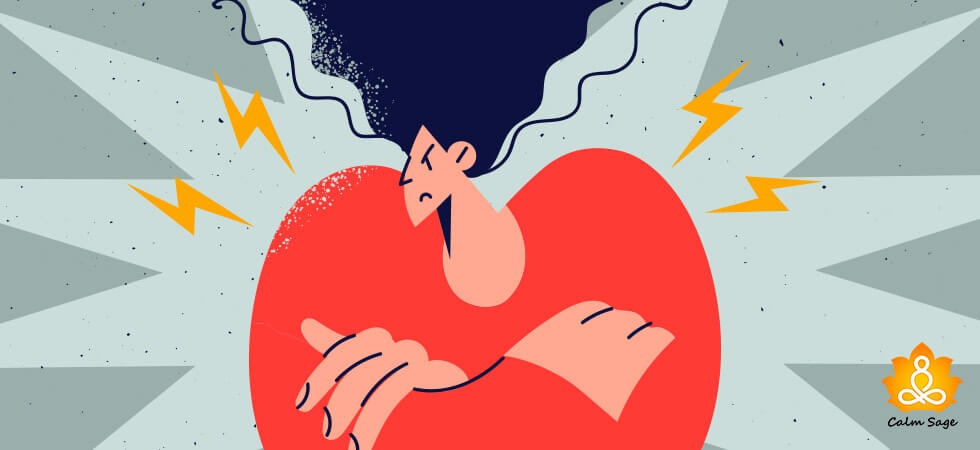Symptoms Of Rage Attacks + 7 Ways To Stop Anger Attacks

Anger is an emotion that we’re all somehow scared of. Some people shy away from expressing anger while others feel comfortable expressing their most distressing emotions via anger. In any case, anger can be terrifying in its own right.
However, when you constantly end up experiencing unprovoked anger outbursts that leave you with the bitter taste of regret, it could be rage attacks or anger attacks plaguing your life.
It’s not uncommon for people to experience anger at unexpected events that might cause them distress and find that there’s no way to express their frustrations other than anger. Also, you might not know but people with certain anxiety disorders and depressive disorders might be more prone to anger attacks.
Below, let’s understand what is an anger attack, what are common anger attack symptoms, what could cause rage attacks, and how you can stop anger attacks from getting out of hand.
What Are The Symptoms Of Anger Attacks?

Anger attacks or rage attacks are more than just being angry. As you might think, anger attacks resemble panic attacks but without the response of fear and anxiety. It’s more or less an overreaction to a distressing situation.
Here are some common anger attack symptoms that you should keep in mind;
- Chest pain or discomfort
- Dizziness
- Excessive sweating
- Fear of losing control
- Wanting to attack others
- Racing heartbeat
- Hot or cold flashes
- Intense feelings of fear and anxiety
- Attacking others (physically)
- Shaking
- Trembling
- Shortness of breath
- Throwing things
- Tingling in the limbs
While anger attacks might just be an overreaction to anger, they can still harm your mental, physical, and emotional health.
Anger attacks might look unprovoked, but they happen when you feel emotionally trapped in a situation and fear that there’s no way out. Such situations can soon become overwhelming and to escape them, you may lash out in rage.
Depression can be another cause of anger attacks. When you are too overburdened with feelings of hopelessness and sadness, these feelings can be disguised as anger, making you lash out at your loved ones.
Other mental health disorders including anxiety disorders, panic disorders, and even psychotic disorders can contribute to sudden and unprovoked rage attacks in adults.
Here are some steps to help you control your anger attacks.
How To Stop Anger Attacks?

If you struggle with anger or rage attacks frequently, then here are some ways to help you deal with your anger attacks;
1. Find Healthy Outlets For Anger
When you fear an anger attack coming, intentionally find healthy ways to express your anger. In the heat of the moment, it can be hard to make a conscious decision so always keep a healthy outlet for anger ready. If you keep choosing a healthy way to express anger, you’ll automatically reach out to it when you’re experiencing anger attacks.
Start small. Try giving yourself a minute or two to think before you act. You can also take a walk or write in a journal to help ease anger attack symptoms.
2. Find The Source Of Your Anger
Anger is more often than not a symptom of another problem. Try figuring out your source of anger. Of course, the problem might vary from person to person. You might struggle with anger attacks because you feel overwhelmed, but someone else might experience rage attacks because of depression or anxiety.
3. Get Regular Exercise
Did you know that you can calm your anger attacks if you regularly exercise? Trust me when I say that research has shown many benefits of exercising regularly including calming down anger and other strong emotions. Exercise can help release endorphins and improve your mood. You can also find that exercising helps release tension before it turns to anger.
4. Change Your Communication Style
Words spoken in anger and grief can be harsh and can leave you with regret later. So, consciously make an effort to change your communication style. Try to use more “I” statements than “You” statements. Instead of saying, “You’re making me angry!” say, “I feel anger when you do hurtful things.”
5. Try Relaxation Techniques
In the throes of anger, counting to 10 might or might not help you calm down. But, practicing relaxation techniques regularly can make it a habit to calm down before replying in anger. Deep breathing, mindfulness meditation, and yoga might all help you understand your anger and help you gain control over it.
Again, try small. Inhale through your nose while counting to 4, hold your breath for 4 seconds, exhale through your mouth while counting to 4, and again hold your breath for 4 seconds. Repeat as needed.
6. Control Your Triggers
One of the simplest ways to control your anger attacks is to identify and control your triggers. When you know your triggers, you can easily control them or eliminate them as necessary. For example; if your anger attacks manifest because of overwhelming situations, then you can distance yourself from such situations before things escalate.
7. Seek Professional Support
Anger is a strong emotion and many might even perceive it as a negative one, but it might not always be a negative emotion. It can be hard to figure out on your own where your anger issues stem from, so in that case, you can always seek professional help and support. A therapist can help you come up with healthy coping techniques to process your anger and avoid anger attacks.
When you allow anger to take over your life and decisions, it can be a distressing experience for everyone involved. Constant rage issues and anger attacks can cause difficulty in relationships, professional life, and even social life.
Fortunately, you don’t always have to live with the fear of anger attacks. With the right steps and treatment, you can deal with and stop anger attacks in their tracks before they can harm you further.
I hope you found this article enlightening and helpful. Feel free to share your thoughts and tips to control anger attacks in the comments below.
Take Care!




















